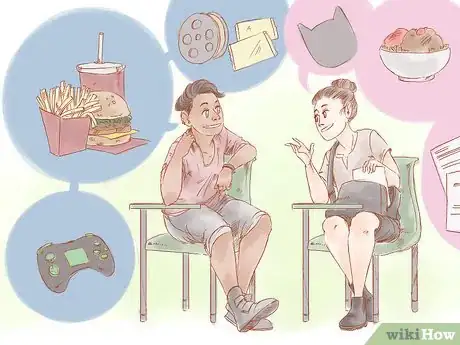This article was co-authored by Patrick Muñoz and by wikiHow staff writer, Hunter Rising. Patrick is an internationally recognized Voice & Speech Coach, focusing on public speaking, vocal power, accent and dialects, accent reduction, voiceover, acting and speech therapy. He has worked with clients such as Penelope Cruz, Eva Longoria, and Roselyn Sanchez. He was voted LA's Favorite Voice and Dialect Coach by BACKSTAGE, is the voice and speech coach for Disney and Turner Classic Movies, and is a member of Voice and Speech Trainers Association.
There are 12 references cited in this article, which can be found at the bottom of the page.
wikiHow marks an article as reader-approved once it receives enough positive feedback. This article has 17 testimonials from our readers, earning it our reader-approved status.
This article has been viewed 8,578,998 times.
If you have a hard time striking up a conversation when there’s seemingly nothing to talk about, you’re definitely not alone! It can be kind of awkward for anyone, but the good news is that a) there are actually a lot of good conversation starters you can memorize so you have them in your back pocket the next time this happens, and b) starting conversations one hundred percent gets easier with practice and it’s definitely possible to get better at it. Below we’ve put together some tips to help you start conversations with people, find things to talk about, and actually enjoy yourself in the process!
Steps
Starting the Conversation
-
1Introduce yourself if you’ve never met the person before. If you want to talk to a stranger, approach them, make eye contact, and smile. Say hello and tell them your name so they feel comfortable around you. Offer a handshake so the other person feels connected to you and more willing to talk. Ask them for their name so you have a natural lead-in to a longer conversation.[1]
- For example, you may say, “Hi, my name is John. It’s nice to meet you.”
- You don’t need to introduce yourself if you just want to have a casual conversation, but it will help make people more receptive to you.
-
2Say something positive to invite others to join the conversation. Mentioning something negative at the start of your conversation may make others unwilling to open up and talk with you. Bring up something around you that you really enjoy and smile while you’re talking to the other person is more likely to open up and talk with you. After you mention what you enjoy, you ask them how they feel about it to get them involved.[2]
- For example, if you’re at a party, you may say, “This music is really cool! Do you like it?” or, “Have you tried the food yet? It’s really delicious.” Ending with a question encourages the other person to respond and start a conversation.
- If the other person is shy or insecure, taking the lead and opening yourself up to them can help put them at ease.[3]
Advertisement -
3Give a compliment to the person to ease into talking with each other. Talk about the person’s personality or something they’re wearing when you give a compliment. Be genuine with your compliment or else the person may feel like you aren’t being truthful and deter them from talking to you.[4] Follow up with a question to keep the conversation going, or else they may not respond.[5]
- You may say something like, “That dress looks really nice. Where did you get it?” or, “You have a good sense of style. How do you find outfits to wear?”
- Use open-ended questions as much as you can so the conversation doesn’t end with “yes” or “no.”
- Avoid bringing up someone’s appearance since it could make them uncomfortable and they may not respond well to it.
-
4Mention your surroundings to start a conversation if you can’t think of anything else. If you’re unable to think of a way to transition into a conversation, look around where you and make an observation about something you see. It can be about the weather, a venue, other people, or an event taking place. Stay positive in your conversation so you seem inviting to the other person and you make them more interested in talking to you.[6]
- For example, you may say, “This is my first time at this cafe. Have you tried anything here?” or, “I wish the sun would come out today. When’s the last time it wasn’t cloudy.”
- Have a sense of humor when you’re having your conversation. It will make others feel engaged and make your chat more enjoyable.
Finding Topics to Talk About
-
1Ask the person what they do for work or school so you can relate to them. Reach out to the person you want to talk to and mention work or school. Ask them what their job involves, how long they’ve been there, and ask if they’ve done anything interesting lately. If they’re still in school, ask them what they’re studying and what they hope to do when they graduate.[7]
- Be sure to answer any questions if they ask about your job or education as well.
- Show genuine interest in their job, even if it doesn’t sound the most exciting to you. Use it as an opportunity to learn more about the person and the subject.
- Asking people a few questions about themselves can help them feel valued and respected.[8]
-
2Talk about hobbies that you both enjoy to learn more about the person. People enjoy talking about things they’re passionate about, so ask the person what they like to do outside of work or school, and note any areas that sound interesting to you. See what their favorite thing about the hobby is and what they like about it. When they ask you about your hobbies, mention any that are similar to theirs first so you can hold a conversation about it. If you’re interested in one of their hobbies, ask them how to get involved so you can try it too.[9]
- For example, you may say something like, “Oh, I’ve never tried woodworking. What’s the best thing to do for a beginner?”
- Make sure you don’t talk over the other person or talk only about your hobbies. Ask questions about what the other person enjoys so you can have a good back-and-forth dialogue.
-
3Discuss movies, TV shows, or books if you want to talk about pop culture. Many people share similar tastes in media, so talk about recent films or music that you’ve seen or listened to and gauge the other person’s interest. Ask them what content they’ve been enjoying lately and let them explain why they like it. If you both have seen or heard the same thing, have a discussion about it and talk about your opinions to keep the conversation going.[10]
- For example, you could say, “Have you seen the newest Star Wars movie? What did you think of the ending?” or, “What music do you like to listen to? Do you have a favorite artist I should check out?”
- Even if you disagree with their opinions, stay positive and say something like, “Oh, I never thought of it that way, but I understand your point.” That way, the other person will still feel engaged with the subject rather than being shot down.
- If you don’t know what the other person is talking about, ask them to clarify or explain what happens so you can get a better understanding of it. It’s okay to say “I don’t know,” if you’re unfamiliar with media they’re discussing.
-
4Chat about your past experiences if you want to open up to the other person. If you feel comfortable with the other person, you may ask about their past or what they want to do in the future. Ask them about funny things that happened to them, what their family is like, or goals they have. Open up about your own experiences so you can share them and connect with the other person.[11]
- For example, you may say something like, “Where are you originally from? Did you like it there?” or, “What did you want to be when you grew up?”
- Strangers may find it odd if you ask too much about their personal life right when you meet them. Only ask deeper questions if you both feel comfortable responding to them.
- Never try to “one-up” the person or try to impress them, since it may make them uncomfortable and want to leave the conversation.
-
5Ask for the person’s opinion on current events to engage them. Look up current events in the news or on social media and mention them to the other person. Have at least 1-2 events that happened in the past week ready so you can pull them out in your conversation. See what they think of the news and ask them how they feel on the subject. Be ready to talk about your opinions as well since they may ask you the same thing.[12]
- For example, you may say something like, “Did you hear about the new music app that just came out? I saw it on the news.”
Warning: Be careful talking about heated subjects, such as politics or religion, since they could make people upset or unwilling to talk.
Staying Engaged in the Conversation
-
1Listen to the other person actively so you can respond to the other person. Put away your phone and focus your attention on the other person while they’re talking. Maintain eye contact with them so they know that you’re paying attention to them and actively listen to what they’re saying. Ask them questions based on what they say so to stay involved in the conversation.[13]
- When they end their thought, briefly restate something they said so they know you were paying attention to them. For example, if they mentioned getting a new vehicle, you can ask, “What kind of car did you end up getting? Does it drive well?”
- Try to avoid thinking of other things while the other person is talking since you may not respond naturally to them when they finish.
-
2Use the phrase, “That reminds me of,” to transition to a new topic. If the other person mentions something that you can relate to while they’re talking, use the phrase, “That reminds me of…” before talking about your topic. This way, you can easily go between multiple topics in a natural way without any awkward breaks in the conversation. Make sure the topics are related in some way to make it a smooth transition so it’s easier for the other person to follow along.[14]
- For example, if they mention the nice weather, you may say something like, “That reminds me of the gorgeous weather in Hawaii when I visited. Have you been there?”
Tip: You can use, “This reminds me of…” after a break in the conversation if you mention something in your surroundings. For example, if you’ve already talked to the other person and a musician comes on, you may say, “Oh, this guy is very good. He reminds me of another artist.” Then you can transition into talking about music.
-
3Say things when they come to your mind to keep the conversation exciting. If you have something come into your head during a random break in the conversation, bring it up and ask the other person about it. Don’t interrupt the other person if you think of something while they’re talking, since it’s rude. Make sure the topic isn’t something that would make the other person uncomfortable, or else they may not want to continue talking.
- For example, you may say, “I just remembered a funny news story I found online. Do you want to hear it?”
- The person may not be as receptive of a random topic if you haven’t already talked to them yet.
Fun Conversation Starter Examples
Community Q&A
-
QuestionWhat do I do if the person I'm talking to is shy?
 Community AnswerStart small, and don't overload them with questions. Try to find common ground.
Community AnswerStart small, and don't overload them with questions. Try to find common ground. -
QuestionI always think I am a boring friend. How can I overcome that and be a fun person?
 Duckmaster9Community AnswerHave Confidence. Be the person you enjoy being. Act the way you want to act. If your friends don't like who you are then they should not be your friends. Also make sure you are being happy and optimistic around them and they may lighten their mood around you.
Duckmaster9Community AnswerHave Confidence. Be the person you enjoy being. Act the way you want to act. If your friends don't like who you are then they should not be your friends. Also make sure you are being happy and optimistic around them and they may lighten their mood around you. -
QuestionI am shy and I stammer (not excessively), so I find it difficult to start a conversion and even make new friends. I haven't made any new friends of the opposite sex this year. What can I do?
 Marvin David Angelo J. BullagayCommunity AnswerFirst, be honest with them. Tell them that you are quite shy, and find it difficult to start conversations. You'll witness a miracle afterwards: they're the ones who will start a conversation with you. Warm up to them, and just be yourself.
Marvin David Angelo J. BullagayCommunity AnswerFirst, be honest with them. Tell them that you are quite shy, and find it difficult to start conversations. You'll witness a miracle afterwards: they're the ones who will start a conversation with you. Warm up to them, and just be yourself.
Warnings
- Avoid talking about topics where the conversation could get heated, such as politics or religion.⧼thumbs_response⧽
References
- ↑ https://www.canr.msu.edu/news/using_a_persons_name_in_conversation
- ↑ https://www.indeed.com/career-advice/career-development/how-to-start-a-conversation
- ↑ Patrick Muñoz. Voice & Speech Coach. Expert Interview. 12 November 2019.
- ↑ Patrick Muñoz. Voice & Speech Coach. Expert Interview. 12 November 2019.
- ↑ https://www.researchgate.net/publication/343948099_Why_a_Simple_Act_of_Kindness_Is_Not_as_Simple_as_It_Seems_Underestimating_the_Positive_Impact_of_Our_Compliments_on_Others
- ↑ https://www.indeed.com/career-advice/career-development/how-to-start-conversation-with-strangers
- ↑ https://www.scienceofpeople.com/have-hold-conversation/
- ↑ Patrick Muñoz. Voice & Speech Coach. Expert Interview. 12 November 2019.
- ↑ https://www.psychologistworld.com/behavior/interpersonal-skills/smalltalk-conversation-form-technique
- ↑ https://myhealth.alberta.ca/speech-language-hearing/language/for-preschoolers/conversation-topics-kids
- ↑ https://www.scienceofpeople.com/conversation-starters-topics/
- ↑ https://www.helpguide.org/articles/anxiety/social-anxiety-disorder.htm
- ↑ https://www.ted.com/talks/celeste_headlee_10_ways_to_have_a_better_conversation/transcript?referrer=playlist-talks_for_when_you_re_starting_a_new_job_aug_2017&language=en
- ↑ https://positivepsychology.com/active-listening/
About This Article
Spending time with someone when you have nothing to say can feel awkward, but by looking for something positive to talk about and finding ways to relate to them, you can easily break the ice! If you don’t know the person, start by introducing yourself. Then, comment on something positive to make the conversation more inviting. For example, you could offer them a sincere compliment or mention how nice the view is. Once you’ve opened up the conversation, ask them open-ended questions to find out more about them. For instance, you could ask what they do for a living or talk about what hobbies they enjoy. You may even discover that you have some common interests, which can be a great lead-in to a deeper conversation! Even if you don’t have much in common, you might be able to talk about subjects that most people are familiar with, like popular movies, books, or current events. For more tips from our Speech co-author, including how to keep the conversation going, read on!




















-Step-11.webp)





















































